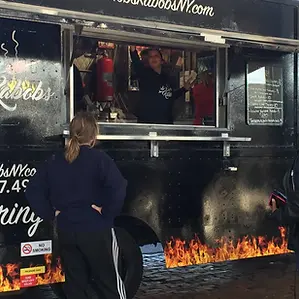[Free 2025 Guide] How to Start a Food Truck in Washington
One should identify strategic locations and events in Washington that attract a large crowd, ideal for a food truck business. Consider the weather and seasonal factors in Washington when planning the operation schedule and menu for the food truck. Developing a menu that resonates with the culinary preferences of Washington's residents can significantly contribute to the success of a food truck.


Insurance Coverage for Food Trailers in Washington
Insurance Coverage for Food Trailers in Washington
In Washington, all food trailers must be registered with the Department of Licensing (DOL). The registration fee for a noncommercial trailer with a Gross Vehicle Weight (GVW) under 10,000 lbs is $125 for a one-time registration, while trailers over 10,000 lbs require permanent registration costing $800.
The required documents for registration include a completed registration form, proof of insurance, and the trailer title. If the trailer is new, a bill of sale is also required. Farm-use trailers are exempt from registration, but they must comply with safety requirements.
In Washington, the towing vehicle's liability insurance generally extends to the trailer, but food truck operators are advised to carry additional collision coverage to protect their trailer and equipment.
Minimum liability coverage for the towing vehicle is $15,000 per person and $30,000 per accident.
Summarized Business Regulations for Cottage Food Laws in Washington
A "cottage food operation" refers to individuals who exclusively make certain food items in their own home kitchens within Washington state and sell these products directly to consumers. This practice is limited to the producer's primary domestic residence and involves the creation of specific food items permitted by local regulations for sale directly to customers without the need for a commercial kitchen or facility.
Example of Successful Food Trucks in Washington

Home Bites
Sandwiches, burgers fries and more

Wet-Mex Food Truck
Mexican food

QT Food Truck
Mexican food

How to Register and Title Your Food Truck in Washington [2025]
In Washington, all food trailers must be registered with the Department of Licensing (DOL). The registration fee for a noncommercial trailer with a Gross Vehicle Weight (GVW) under 10,000 lbs is $125 for a one-time registration, while trailers over 10,000 lbs require permanent registration costing $800.
The required documents for registration include a completed registration form, proof of insurance, and the trailer title. If the trailer is new, a bill of sale is also required. Farm-use trailers are exempt from registration, but they must comply with safety requirements.

Washington Food Trailer Braking System Requirements
In Washington, trailers with a GVW over 3,000 lbs must be equipped with a separate braking system, typically electric brakes, though hydraulic brakes are also acceptable.
Trailers weighing 3,000 lbs or less are not required to have separate brakes, though the towing vehicle must still provide adequate braking.
Lighting, Reflectors, and Safety Chains Requirements for Food Trailers in Washington
Washington requires food trailers to have two red tail lights visible from 500 feet, amber reflectors on the sides, and functioning turn signals. Additionally, trailers must be equipped with at least one safety chain connecting the trailer hitch to the towing vehicle. Safety chains must be rated to handle the full GVW of the trailer.

![Fast Track to Six-Figure Food Truck Profit in Washington [2025 Bundle with Guides, Calculators and Full Business Plan]](https://static.wixstatic.com/media/aec654_ef58134b17534e6dad537234a7406e4f~mv2.jpg/v1/fill/w_562,h_375,al_c,q_80,usm_0.66_1.00_0.01,enc_avif,quality_auto/aec654_ef58134b17534e6dad537234a7406e4f~mv2.jpg)


















